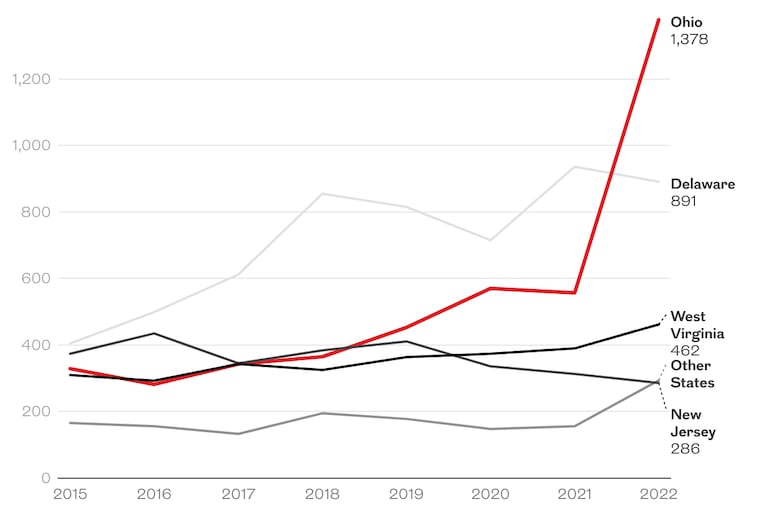Out-of-state residents drove an increase in abortions in Pennsylvania in 2022
Ohio was among the states that quickly enacted abortion restrictions following the Supreme Court's 2022 ruling.

The phones at one of the Pennsylvania abortion clinics closest to the Ohio border started ringing off the hook two years ago, after the U.S. Supreme Court overturned decades-old national abortion protections.
Ohio quickly enacted a near total abortion ban. And at the Allegheny Reproductive Health Center in Pittsburgh, just over 40 miles from the Ohio border, demand for abortion services surged overnight. The abortion clinic’s call volume shot up 10 times the norm, and it treated three times as many patients.
“We had been preparing for this, knowing it was going to get bad,” said Sheila Ramgopal, a doctor and the CEO of Allegheny Reproductive Health Center in Pittsburgh. “And we were still not ready.”
Pennsylvania, where abortion remains legal through the 23rd week of pregnancy, has become a critical access point for a growing number of patients in the middle of the country, where services are increasingly restricted.
Abortions in Pennsylvania among out-of-state residents rose nearly 41% in 2022, driven largely by patients from Ohio and 20 other states that restricted access after the Supreme Court’s decision, according to the latest available data from the Pennsylvania Department of Health.
Two years later, clinics here are continuing to adapt to an evolving abortion landscape. State abortion bans led about 171,000 people to travel outside their home state for an abortion in 2023, according to a new report from the Guttmacher Institute, which tracks national trends in abortion services.
“The abortion landscape has been changing really fast and it has caused big shifts in travel,” said Isaac Maddow-Zimet, a data scientist with the Guttmacher Institute.
» READ MORE: Pa. abortion providers braced for a surge in patients before Roe v. Wade was overturned
Increase in abortion services
There were 34,838 abortions in Pennsylvania in 2022, a 15% increase over 2018.
The vast majority of abortions were among Pennsylvania residents. Out-of-state residents accounted for 3,311, or 9.5%, of abortions in 2022.
The increase in abortions is partly due to clinics expanding services, providers said.
Planned Parenthood Southeastern PA, which operates clinics in Philadelphia, hired more doctors and added appointment days to accommodate more patients after the 2022 decision in Dobbs v. Jackson Women’s Health Organization.
“Prior to Dobbs, we had a dearth of abortion providers,” said Dayle Steinberg, CEO of Planned Parenthood Southeastern PA. “So many have responded to the cause and the need.”
» READ MORE: Four Philadelphia abortion providers talk about what drives them
Planned Parenthood Keystone, which operates clinics in York, Harrisburg, Allentown, and Wilkes-Barre, also added another day for in-person appointments and expanded its telemedicine services. Its Warminster location is closing at the end of June as services shift to the nearby Bensalem clinic.
More out-of-state patients
Pennsylvania saw a sharp increase in out-of-state abortion patients in 2022. The number of out-of-state residents treated at Pennsylvania abortion clinics shot up 41% from 2021 to 2022.
Clinics in Western Pennsylvania, particularly those in Pittsburgh, were hardest hit by the influx of out-of-state patients.
Allegheny Reproductive Health Center in Pittsburgh increased its staff by 30%, extended clinic hours, and added more service days in anticipation of more patients.
It wasn’t enough, Ramgopal said. The clinic could normally see patients within a week of calling for an appointment, but after Ohio banned abortion, patients were waiting up to a month for an appointment.
Pittsburgh-area patients drove to Allentown, Harrisburg, or Philadelphia, where wait times were shorter, Ramgopal said.
“Everyone was suffering,” Ramgopal said.
Ongoing policy changes
Patients who can’t access abortion care in their home state often seek services at the next-closest clinic.
A majority of out-of-state patients who sought care in Pennsylvania in 2022 were from Ohio, Delaware, and West Virginia.
The flow of patients from Ohio to Pennsylvania began to subside last November, when voters approved a ballot initiative to protect abortion rights under the state constitution, Ramgopal said.
But as more states restrict abortion, patients are increasingly traveling greater distances.
Pennsylvania clinic leaders said they expect to see more patients from Florida, where a ban on abortion after the sixth week of pregnancy went into effect in May.
And in many cases, they cross multiple state lines. Patients as far away as Texas, where nearly all abortions are banned, are flying to New York, New Jersey, and elsewhere in the Northeast for abortion services, said Maddow-Zimet, the Guttmacher data scientist.
“At a certain point it’s not a question of driving distance, but where can I find a place to stay? Where can I get the cheapest flight?” he said.